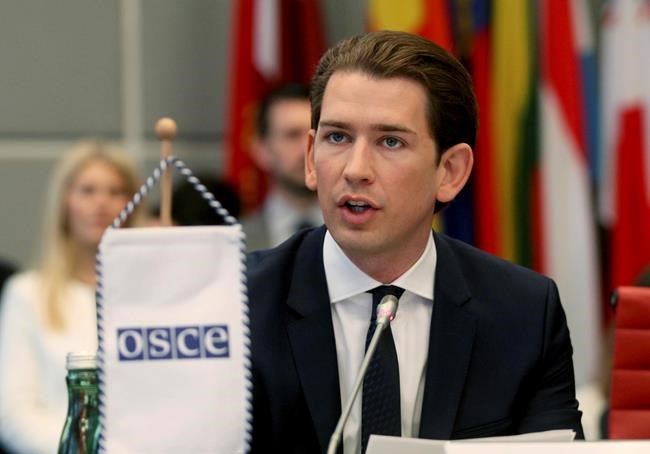
FILE - In this May 23, 2017 file photo Austrian Foreign Minister Sebastian Kurz delivers a speech during a conference on terrorism of the Organization for Security and Cooperation in Europe, OSCE, at the Hofburg palace in Vienna, Austria. Kurz leads the Austria People Party_now under the name Liste Sebastian Kurz_in Sunday's Austrian national elections. (AP Photo/Ronald Zak, file)
Republished October 12, 2017 - 5:29 AM
Original Publication Date October 12, 2017 - 4:06 AM
VIENNA - Ahead of Austrian national elections Sunday, the question is less whether the country will swing rightward under the next government and more about how sharp that turn will be, with voters set to reward two major parties that have exploited fears of immigration and Islam.
Chancellor Christian Kern is vowing to take his centre-left Social Democrats into the opposition if defeated and a handful of small parties are struggling to clear the 4 per cent hurdle needed to get seats in parliament. Thus signs point to a coalition between the People's Party and the Freedom Party — which would represent a shift with implications for the European Union.
The Freedom Party is strongly euroskeptic. And while it has long distanced itself from its Nazi roots, and its leader, Hans-Christian Strache, has dismissed his own links with neo-Nazi organizations as youthful folly, its presence in a government could present a new challenge to moderate EU governments shortly after Germany's anti-migrant and EU-critical AfD gained seats in the federal parliament for the first time.
Few saw it coming two years ago. Back then, the Social Democratic-People's Party coalition fervently backed German Chancellor Angela Merkel's open border policy, as hundreds of thousands of mostly Muslim migrants flooded into Austria and beyond in their search for a better life in Europe's heartland. The two parties criticized the Freedom Party's call for closed borders and zero migration.
But the People's Party has a new head — and a new message. Since taking over this spring, Foreign Minister Sebastian Kurz has essentially usurped the Freedom Party stance on migration and fears of radical Islam as he taps into what pollsters identify as voters' greatest concern.
That will cost the Freedom Party some votes. But the Social Democrats appear to have been hurt most, with their focus on social fairness and support of the economically disadvantaged appearing to fall on less receptive ears than calls for a hard line on migrants and Muslims.
The Social Democrats won the last elections four years ago. But a Research Affairs poll this week shows them third with 23 per cent support. First is the People's Party with 33 per cent, followed by the Freedom Party at 27 per cent. The poll with 1,000 respondents gave an error margin of 3.10 percentage points.
Previously associated with stagnation and lack of direction, the People's Party was trailing in third place until Kurz took leadership in May after securing party pledges of full authority.
The telegenic 31-year old already was known for shutting down the Western Balkan route into prosperous EU nations for migrants. With early elections set after the breakup of the coalition with the Social Democrats, he rapidly remade the party in his own image.
Although the People's Party was part of the government coalition that opened the borders to hundreds of thousands of migrants in 2015, the party now says that "the political establishment failed in dealing with the refugee crisis."
Calling for zero illegal immigration, he says migrants intercepted on the high seas should be shipped to refugee centres in North Africa instead of Europe. Migrants waiting for a decision on their asylum applications should be forced to work menial jobs in exchange for pocket money. And instead of the normal six-year waiting period for Austrian citizenship, those receiving asylum should wait for 10 years, he says.
Such calls attract Austrians who support the Freedom Party and Strache, its leader on migration, but dislike the radical way the populist party frames the debate. Kurz, says political analyst Thomas Hofer, "uses a different kind of language, and it's not extreme language — it's plain talk."
And Kurz has something else in his favour for an electorate disaffected with the status quo. "He was able — even though he was in government for more than six years — to present himself as the 'change guy," says Hofer.
A scandal rocking the Social Democrats also works to Kurz's advantage.
Kern, the chancellor, cut ties with Israeli political adviser Tal Silberstein nearly two months ago, following Silberstein's detention in his homeland on suspicion of money laundering. But the scandal deepened after Silberstein acknowledged being behind Facebook platforms crudely ridiculing Kurz and suggesting that he was anti-Semitic and xenophobic.
Both Kern and Silberstein insist that the chancellor had no knowledge of the affair. But that argument is backfiring on Kern, a former head of Austria's state railway who came into the job last year with the reputation of a crisis manager set to re-establish order to a party splintered by infighting.
Even if Kern didn't know, "it's a bad situation for him," says Hofer. "Because it just means that he wasn't in charge of the whole campaign.
"And of course, this is damaging his credibility as a leader."
News from © The Associated Press, 2017